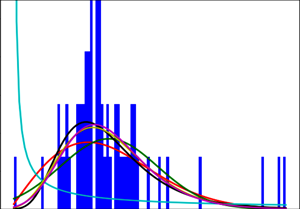Statistical analysis of ground clutter from FM based passive radar
DOI:
https://doi.org/10.3103/S0735272719080028Keywords:
passive radar, ground clutter analysis, chi-squared test, Kolmogorov–Smirnov test, statistical analysisAbstract
Statistical characterization of ground clutter information for radar systems is a topic that requires a detailed understanding. In this work, we characterize the ground clutter information from data captured by two Frequency Modulation (FM) based passive radar systems placed at different locations in the Czech Republic. Since the target models are statistically defined by the Swerling models, each of which is based on a particular distribution, we attempted to connect the ground clutter with some of the known distributions. The analysis is performed in three steps. The empirical distribution is fitted with some of the well-known distributions. Two different goodness-of-fit tests (named chi-squared test and Kolmogorov–Smirnov test) are performed on the obtained data by comparing the empirical distribution with the fitted distributions to determine which distribution is the best fit. The observations are analyzed and the results are considered in detail.References
- MUSICKI, Darko; SUVOROVA, Sofia; MORELANDE, Mark; MORAN, Bill. “Clutter map and target tracking,” Proc. of 8th Int. Conf. on Information Fusion, 25-28 Jul. 2005, Philadelphia, USA. IEEE, 2005, v.1, p.8. DOI: https://doi.org/10.1109/icif.2005.1591838.
- MALANOWSKI, Mateusz; HAUGEN, Reidar; GRECO, Maria S.; O’HAGAN, Daniel W.; PLSEK, Radek; BERNARD, Alan. “Land and sea clutter from FM-based passive bistatic radars,” IET Radar, Sonar & Navigation, v.8, n.2, p.160, 2014. DOI: https://doi.org/10.1049/iet-rsn.2013.0186.
- BILLINGSLEY, J. Barrie; FARINA, Alfonso; GINI, Fulvio; GRECO, Maria Valerina; VERRAZZANI, Lucio. “Statistical analyses of measured radar ground clutter data,” IEEE Trans. Aerospace Electronic Systems, v.35, n.2, p.579, 1999. DOI: https://doi.org/10.1109/7.766939.
- POPOV, D.I. “Clutter parameter estimation based on indirect algorithms,” Radioelectron. Commun. Syst., v.62, n.1, p.42, 2019. DOI: https://doi.org/10.3103/S0735272719010060.
- CONTE, E.; DE MAIO, A.; GALDI, C. “Statistical analysis of real clutter at different range resolutions,” IEEE Trans. Aerospace Electronic Systems, v.40, n.3, p.903, 2004. DOI: https://doi.org/10.1109/taes.2004.1337463.
- SCHLANGEN, Isabel; DAUN, Martina. “Different tools for clutter mapping,” in: GI Jahrestagung, 2010, p.892-897.
- CONTE, E.; DE MAIO, A.; FARINA, A. “Statistical tests for higher order analysis of radar clutter: their application to L-band measured data,” IEEE Trans. Aerospace Electronic Systems, v.41, n.1, p.205, 2005. DOI: https://doi.org/10.1109/taes.2005.1413757.
- HAYKIN, Simon; CURRIE, Brian W.; KESLER, Stanislav B. “Maximum-entropy spectral analysis of radar clutter,” Proc. IEEE, v.70, n.9, p.953, 1982. DOI: https://doi.org/10.1109/proc.1982.12426.
- CONTE, Ernesto; LONGO, Maurizio. “Characterisation of radar clutter as a spherically invariant random process,” IEE Proc. F-Commun., Radar Signal Processing, v.134, n.2, p.191, 1987. DOI: https://doi.org/10.1049/ip-f-1.1987.0035.
- VARDASBI, Ali; SALMASIZADEH, Mahmoud; MOHAJERI, Javad. “Multiple-chi-square tests and their application on distinguishing attacks,” Proc. of 8th Int. ISC Conf. on Information Security and Cryptology, ISCISC, 14-15 Sept. 2011, Mashhad, Iran. IEEE, 2011, p.55-60. DOI: https://doi.org/10.1109/iscisc.2011.6062336.
- HAZEWINKEL, Michiel. Encyclopaedia of Mathematics. Volume 6: Subject Index, Author Index. Springer Science & Business Media, 2013. DOI: https://doi.org/10.1007/978-94-009-5991-0.
- PLSEK, Radek; STEJSKAL, Vojtech; PELANT, Martin; VOJÁCEK, Martin. “FM based passive coherent radar: From detections to tracks,” Proc. of Tyrrhenian Int. Workshop on Digital Communications-Enhanced Surveillance of Aircraft and Vehicles, 12-14 Sept. 2011, Capri, Italy. IEEE, 2011, p.123-127. URI: https://ieeexplore.ieee.org/document/6060976.
- BHATTA, Abhishek; MISHRA, Amit K. “GSM-based commsense system to measure and estimate environmental changes,” IEEE Aerospace Electronic Systems Magazine, v.32, n.2, p.54, 2017. DOI: https://doi.org/10.1109/maes.2017.150272.

Downloads
Published
2019-09-09
Issue
Section
Research Articles

